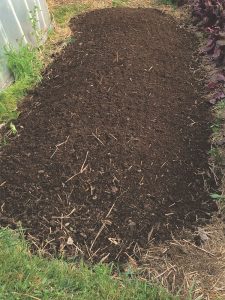Bulletin #4311, Planning and Managing a Community “Giving” Garden in Maine Sections 13-14)
How Finely Should the Soil Be Worked?
The more you work the soil (mixing, digging, rototilling etc.), the more you destroy soil clods or aggregates. The finer you work your soil and the smoother you make the soil surface, the easier it is to form a crust, reducing the amount of water that will infiltrate and be available for your plants. The crust also makes it difficult for germinating seedlings to emerge. If rainfall cannot infiltrate your soil, the more likely your soils will be to erode. If soil erodes into lakes, the phosphorus content can stimulate algal blooms, causing loss of water quality and lake land value. So, any bed that you are planting to established transplants (cabbage, broccoli, tomatoes, peppers, etc.) does not have to be finely prepared. If you are sowing seeds, the fineness of the soil surface should be based on the size of the seed you are planting. For example, planting green beans does not require a fine soil surface, but planting carrots does. We will discuss sowing in more detail in this guide, but for the practice of working your beds, less is often more. Work to improve soil physical properties with compost. The more silt and clay you have in your soil, the more compost will help improve aggregation and facilitate drainage in the spring. If your soils tend to be sandy (coarser textured soils), compost can help that soil accept the water and hold it for plants to use. You really cannot change the percentage of sand, silt, or clay in your soil. But you can improve soil health and soil aggregation by increasing soil organic matter content over time.
Soil Organic Matter Management and Impact on Plants
There are three types of organic matter (OM) in soil: living, dead, and very dead. The living components consist of living organisms in soil (bacteria, fungi, actinomycetes), and other larger organisms (nematodes, earthworms, etc.). These organisms play many important roles in the soil, including releasing nutrients from OM to the plant. Bacteria break down OM and convert plant-unavailable nitrogen (N), phosphorus (P), sulfur (S), and potassium (K) to the plant-available forms. This is obviously very important for production purposes. Bacteria are generally favored by near neutral soil pH, whereas fungi prefer a lower (acidic) soil pH. Keeping cover crops growing during the off-season can provide food for microbes to feed on as the plant roots exude materials that support their metabolism. Particulate OM (the “recently dead” material) is identifiable plant material that is breaking down ultimately to become humus. Humus provides plant nutrients and can help build soil structure. Humus (the “very dead” material) is the dark, unrecognizable product of degradation, consisting of long-chain hydrocarbon compounds that are effective at holding water and soil nutrients. Since compost is organic material that has undergone bacterial and fungal breakdown, additions of compost are essentially equivalent to adding humus to the garden.
Most starting soil OM contents in New England will range from 2–4 percent. With regular additions of organic matter and refraining from overworking the soil, you can easily build the soil OM content to twice that or more. Surprisingly, it is possible to add too much OM to a soil. If you exceed 10–12%, this can pose a risk to groundwater quality. I have been called into places where people had contaminated their neighbor’s drinking water well because their garden soil OM exceeded 15% from using too much animal manure over several years. Aim for 6–9% OM with regular additions of compost and use of cover crops.
The University of Maine System (the System) is an equal opportunity institution committed to fostering a nondiscriminatory environment and complying with all applicable nondiscrimination laws. Consistent with State and Federal law, the System does not discriminate on the basis of race, color, religion, sex, sexual orientation, transgender status, gender, gender identity or expression, ethnicity, national origin, citizenship status, familial status, ancestry, age, disability (physical or mental), genetic information, pregnancy, or veteran or military status in any aspect of its education, programs and activities, and employment. The System provides reasonable accommodations to qualified individuals with disabilities upon request. If you believe you have experienced discrimination or harassment, you are encouraged to contact the System Office of Equal Opportunity and Title IX Services at 5713 Chadbourne Hall, Room 412, Orono, ME 04469-5713, by calling 207.581.1226, or via TTY at 711 (Maine Relay System). For more information about Title IX or to file a complaint, please contact the UMS Title IX Coordinator at www.maine.edu/title-ix/.


